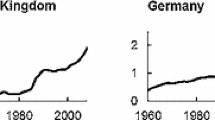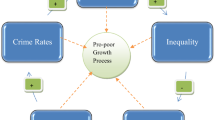Abstract.
This paper employs a microeconometric framework to examine the labor supply responses and the welfare effects from replacing current tax systems in Italy, Norway and Sweden by a flat tax on total income. The flat tax rates are determined so that the tax revenues are equal to the revenues as of 1992. The flat tax rates vary from 23 per cent in Italy, 25 per cent in Norway, to 29 per cent in Sweden. In all three countries the labor supply responses decline sharply with pre-reform disposable income. The results show that the efficiency costs of the current tax systems relative to a flat tax may be rather high in Norway and much lower, but positive, in Italy and Sweden. In all three countries “rich” households – defined by their pre-tax-reform income – tend to benefit (in terms of welfare) more than “poor” households. In Italy and Sweden a majority will lose from a shift to a flat tax, while in Norway a majority is predicted to win.
Similar content being viewed by others
Author information
Authors and Affiliations
Additional information
Received: 19 May 1998/Accepted: 02 July 1999
Rights and permissions
About this article
Cite this article
Aaberge, R., Colombino, U. & Strøm, S. Labor supply responses and welfare effects from replacing current tax rules by a flat tax: Empirical evidence from Italy, Norway and Sweden. J Popul Econ 13, 595–621 (2000). https://doi.org/10.1007/s001480050153
Issue Date:
DOI: https://doi.org/10.1007/s001480050153




